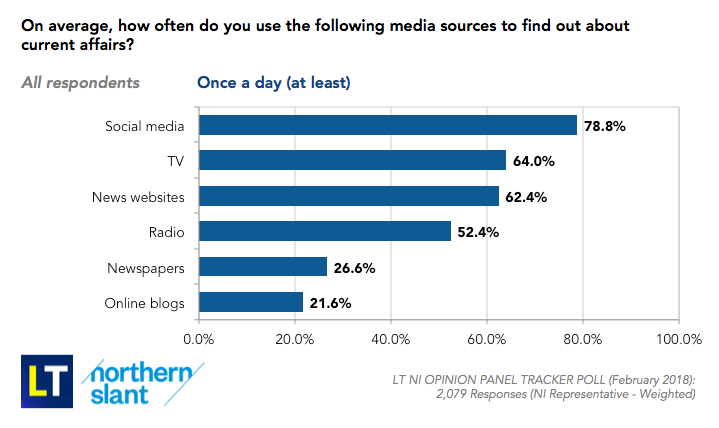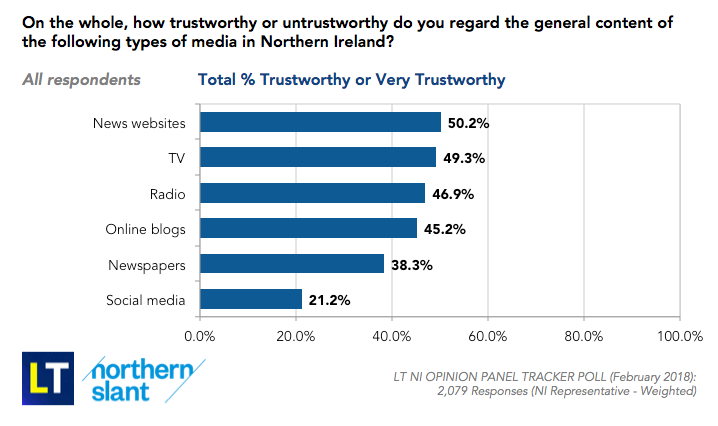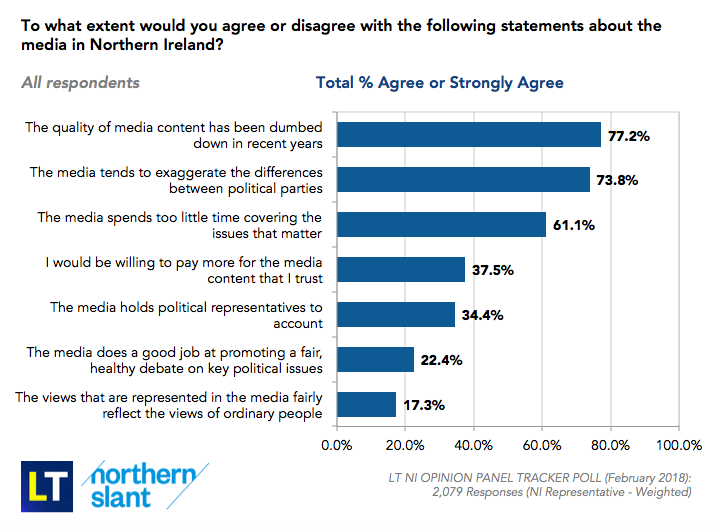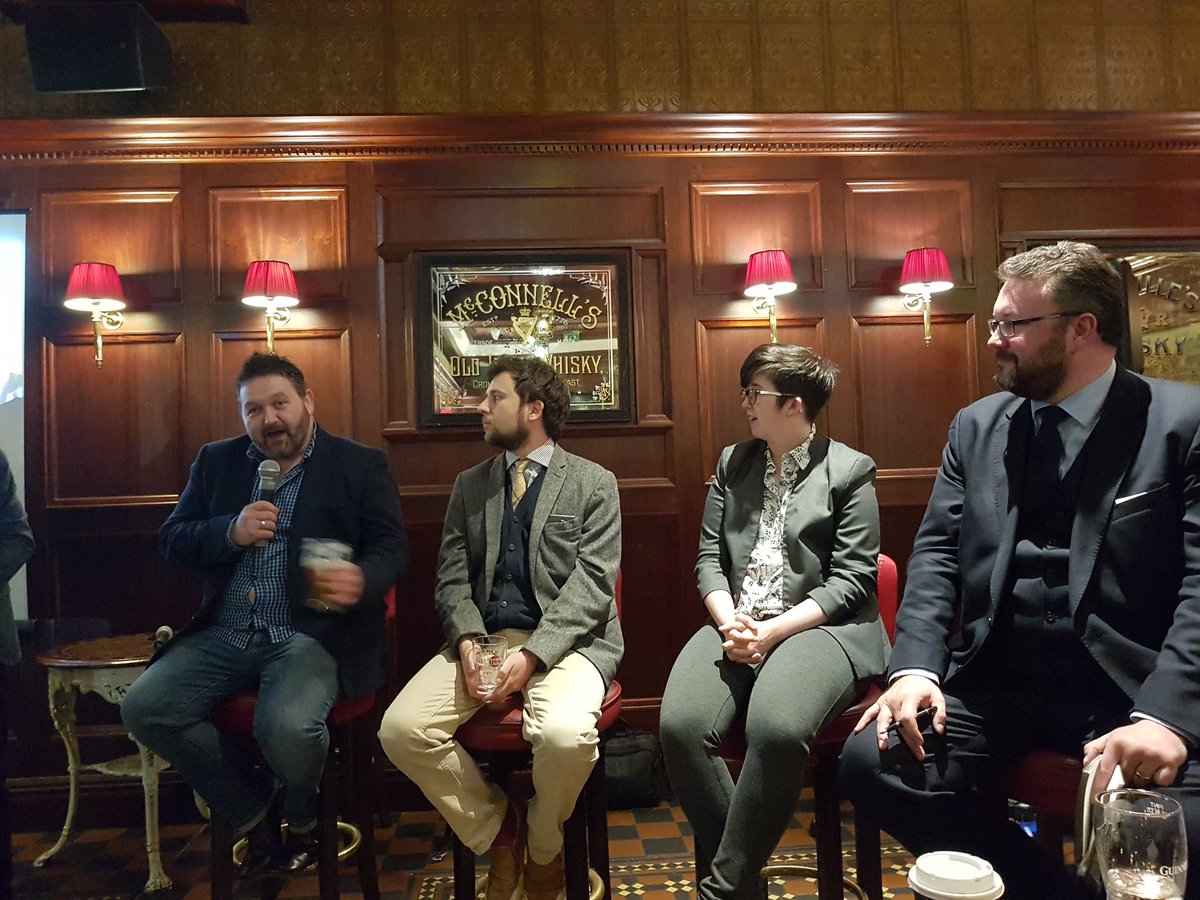In the largest-ever study of “fake news,” announced this past week, researchers at MIT in the United States looked at every contested news story circulated on Twitter over the past ten years – more than 125,000 stories spread by some three million users – and results showed that “…falsehood consistently dominates the truth. Fake news and false rumors reach more people, penetrate deeper into the social network, and spread much faster than accurate stories.”
That appeared depressing proof, if any were still needed, of the old saying that a lie can be halfway around the world before the truth can get its pants on.
The prevalence of misinformation in the mainstream media – particularly in scenarios involving extreme political polarization such as Brexit or the US election – has inevitably thrown a new focus on the extent to which audiences trust the news they read and the organizations and journalists who are providing it.
On Monday evening, Northern Slant hosted a high-powered panel of journalists and authors to kick off the Imagine Belfast Festival by discussing some of the issues currently dominating the industry and examine LucidTalk’s exclusive survey, which shows that Northern Ireland is no exception when it comes to skepticism of platforms like Twitter or Facebook. While nearly 79 per cent of respondents said they regularly used social media, just 21 per cent said they trusted it.
That compared with just over 50 per cent who trusted “news websites” (used at least once a day by 62 per cent of respondents), just under 50 per cent for “TV” (used by 64 per cent) and 47 per cent for “radio” (used by 52 per cent). Only 26 per cent of people said they used newspapers – a reflection of the circulation struggles all-too common for print – although papers were trusted by 38 per cent.
As the News Letter‘s Sam McBride pointed out, people might think they’re getting news from social media, but it’s usually always newspapers that are the drivers of news content that’s being repackaged for social. But, he said, some of the numbers regarding trust are “alarming” and something the industry as a whole has been grappling with.
While only 21 or cent said they regularly used “online blogs” – like Northern Slant and others – just over 45 per cent of respondents said they trusted them. So perhaps there’s encouraging news for that particular new media format.
In the overall context of how trust in the media compares with trust in other institutions, Northern Irish users of social media ranked slightly higher than local mainstream media. That could be a reflection of the fact that one of the highest categories of trust in that comparison was the “Northern Irish ordinary man or woman in the street” – who were trusted by 60 per cent of respondents (just ahead of “pollsters”) compared with 36 per cent for social media and 35 per cent for traditional media.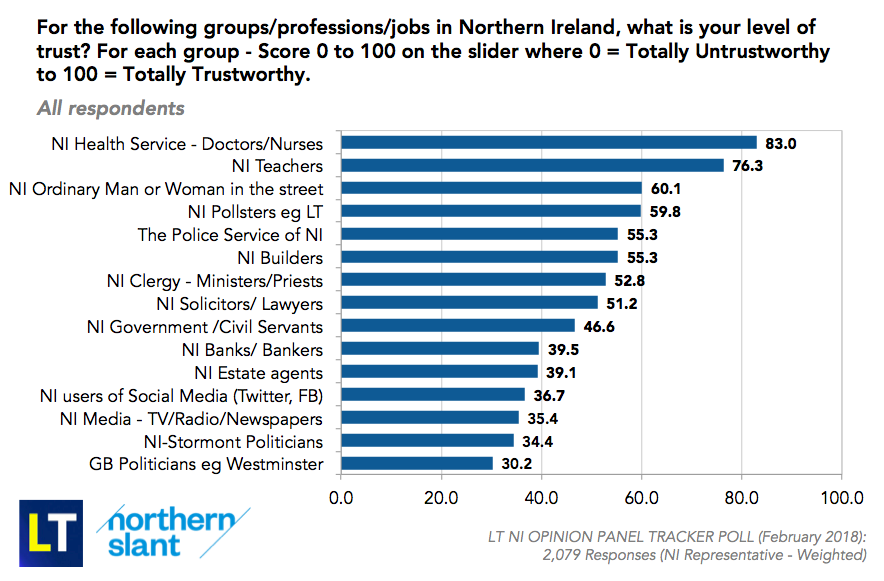
Perhaps unsurprisingly, the only two groups who polled lower than the media in terms of general trust among the public were politicians at Stormont and, bringing up the rear, at Westminster.
The BBC‘s William Crawley said that journalists “have always scored low on trust; there’s nothing new about that” but he pointed out that the difficulty with opinion polls that try to measure trust is, as Onora O’Neill observed, they’re a snapshot of particular circumstances at a particular time. “It’s like a referendum,” he said. “It could be that people happen to be angry about a particular news story and blame the media, so it’s a complicated business to really understand what ‘trust’ means.” And that’s even more difficult in a “hyper-partisan” society.
Taken together, the media numbers could indicate that while people here who use social media might trust each other they might not necessarily trust the platforms. After all, the global phenomenon of a general decline in trust among media and institutions has been, until recently, matched by a growth in respect for the opinions of our peers. Or perhaps it is as simple as trusting information provided by someone you know, that you might be able to independently verify, say about your neighborhood or community, and being more skeptical about news in the bigger picture that is circulated through social platforms.
Interestingly, the number for trust in Northern Ireland’s newspapers is lower than elsewhere in the UK. A recent survey by YouGov showed that local papers were experiencing a “resurgence of trust” with readers saying they were more than three times more likely to trust information provided by their local newspaper, whether online or in print, than by Facebook or Twitter.
Author and New Statesman contributor Kevin Meagher, who lives in the North-West of England, praised Belfast’s “fantastic, high-quality newspapers that are a credit to the journalists who produce them.” But he drew attention to the precarious economic situation and “structural headwinds” facing the industry in the face of technological disruption, saying that, among other things, when newspaper groups lose the institutional memory of long-serving journalists in a bid to cut costs, it inevitably affects their ability to filter and detect things like fake news. Once quality journalism disappears, he said, “it’s not just newspapers that are poorer, society is poorer too.”
One issue that obviously arises in discussion of online trust in news and information is whether the public trusts sites that have subscription paywalls and thus place a value on the content they’re selling, more than those sites whose business model uses news content to drive clicks and page views to sell advertising. While the LucidTalk poll doesn’t break down opinions on specific newspaper titles, of the three big Belfast dailies, the Irish News is the only one with a subscription paywall.
In a discussion about the practicality of micro-payments, Sam McBride observed that one practical problem with paywalls for the news consumer is the sheer number of individual log-ins: “it might seem like a small thing, but there’s a need for a single log-in for serious news organizations.” On generating revenue to support investment in quality journalism, he said: “There’s hope, but the industry needs to see beyond a short-term focus.”
While 77 per cent of survey respondents believe that “the quality of media content has been dumbed down in recent years,” the finding that only 37 per cent of people surveyed said they would be “willing to pay more for the media content that I trust” suggests that the perpetual challenge for publishers of monetizing their content isn’t going away.
Nor has the difficulty in defining “quality” content – whether that is seen as trustworthy or simply that which best meets the needs of an individual reader. And if we’ve learned anything from media surveys, it’s that there is always more than one “audience”.
Lyra McKee said that a big part of the problem with a decline in trust is that people “are moving away from news sources that challenge their worldview” and towards sources that confirm what they already believe. “While we’re seeing a decline in trust of institutions like the New York Times, we’re seeing the growth of an alternative media universe, often sites with little journalistic credibility but have managed to build huge audiences.”
In an environment of partisanship, of course, there will always be a distrust of contrary opinions. Just 34 per cent of respondents said local media “holds political representatives to account.” But perhaps more worrying for all our local media outlets, though, is the finding that only 22 per cent said our media across the board “does a good job at promoting a fair, healthy debate on key political issues,” while just 17 per cent believe the views represented in the media “fairly reflect the views of ordinary people” – there was no breakdown on how that was distributed across different media.
There were large numbers – 73 and 61 per cent respectively – that believe that the media “tends to exaggerate the differences between political parties” and “spends too little time covering the issues that matter.” There will, of course, as is inevitable among any media audience, always be differences of opinion as to what constitutes “issues that matter.”
Sam McBride believes it’s good that people are skeptical about the media they consume, but that there’s a “fine line between skepticism and cynicism.” William Crawley, meanwhile, is guardedly optimistic for the media’s future. “The online/offline distinction will disappear. It’s all going be everywhere, and overwhelming. Philosophers will continue to debate the public/private distinction, and therapists will make a fortune.”
“But if we don’t have a commitment to common principles in public service journalism – which should be our definition of trust – that will be a dangerous situation.”
Track Monday night’s discussion on Twitter at #NSimagine
Suggested Links:
LucidTalk Poll: How Much Do We Trust Politicians?
LucidTalk Poll: Is This The End of The Road For Devolution?
LucidTalk Poll: Why The DUP and Sinn Fein Don’t Want To Compromise
Methodology, and more on LucidTalk
Polling was carried out by Belfast based polling and market research company LucidTalk.
Polling was carried out by Belfast based polling and market research company LucidTalk. The project was carried out online for a period of 80 Hours from 1pm 23rd February 2018 to 9pm 26th February 2018 (80 Hours). The project targeted the established Northern Ireland (NI) LucidTalk online Opinion Panel (10,387 members) which is balanced by gender, age-group, area of residence, and community background, in order to be demographically representative of Northern Ireland.
3,131 full responses were received, and a data auditing process was carried out to ensure all completed poll-surveys were genuine ‘one-person, one-vote’ responses, and also to collate a robust and accurate balanced NI representative sample. This resulted in 2,079 responses being considered in terms of the final results – the results presented in this report. All data results have been weighted by gender and community background to reflect the demographic composition of Northern Ireland resulting in 2,079 responses being considered in terms of the final results. All data results produced are accurate to a margin of error of +/-3.0%, at 95% confidence.
LucidTalk is a member of all recognised professional Polling and Market Research organisations, including the UK Market Research Society (UK-MRS), the British Polling Council (BPC), and ESOMAR (European Society of Market Research organisations).
For more information, visit www.lucidtalk.co.uk and follow @LucidTalk on Twitter.
Also published on Medium.

